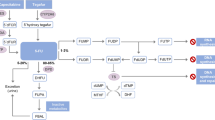Abstract
Dihydropyrimidine dehydrogenase (DPD) is the rate-limiting enzyme in the degradation of pyrimidine bases. DPD is also responsible for the degradation of 5-fluorouracil (5-FU), which is the most frequently prescribed anticancer drug for the treatment of malignancies of the gastrointestinal tract. DPD could influence the antitumor effect and the adverse effects of 5-FU. High intratumoral DPD activity markedly decreases the cytotoxic effect of 5-FU. More than 80% of administered 5-FU is detoxified and excreted as F-β-alanine in urine. In 5-FU-based chemotherapy, escape from the degradation catalyzed by DPD is important. Recently, the dihydropyrimidine dehydrogenase gene (DPYD) was isolated, and its physical map and exon-intron organization were determined. To date, many DPYD variant alleles associated with a lack of DPD activity have been identified. In 5-FU-based cancer chemotherapy, severe toxicities were observed at higher rates in patients who were heterozygous for a mutant DPYD allele, compared with toxicities in patients who were homozygous for the wild DPYD allele. Furthermore, the adverse effects of 5-FU are often lethal for patients homozygous for the mutant DPYD allele. The apparently high prevalence of the DPYD mutation associated with lack of DPD activity in the normal population warrants genetic screening for the presence of these mutations in cancer patients before the administration of 5-FU. DPD inhibitory fluoropyrimidines (DIFs), including uracil plus tegafur (UFT) and tegafur plus 5-chloro-2,4-dihydroxypyridine plus potassium oxonate, in a molar ratio of 1 : 0.4 : 1 (TS-1), have recently been used in clinical settings. DIFs should provide chemotherapy that improves both quality of life and duration of survival.
Similar content being viewed by others
Author information
Authors and Affiliations
Corresponding author
About this article
Cite this article
Omura, K. Clinical implications of dihydropyrimidine dehydrogenase (DPD) activity in 5-FU-based chemotherapy: mutations in the DPD gene, and DPD inhibitory fluoropyrimidines. Int J Clin Oncol 8, 132–138 (2003). https://doi.org/10.1007/s10147-003-0330-z
Received:
Issue Date:
DOI: https://doi.org/10.1007/s10147-003-0330-z




